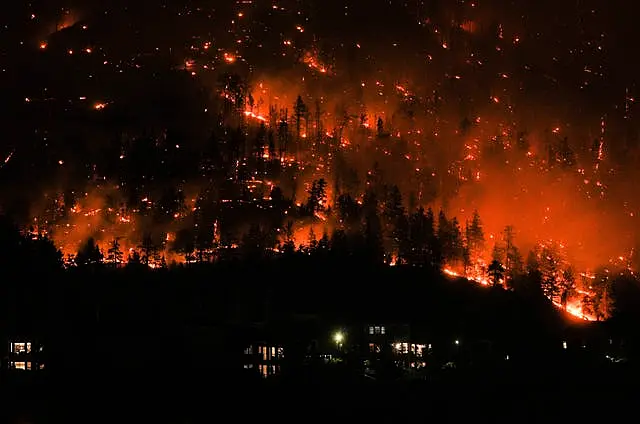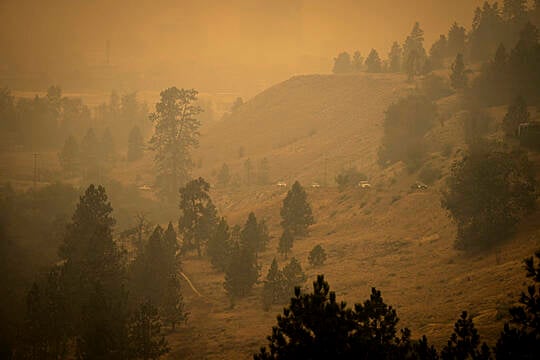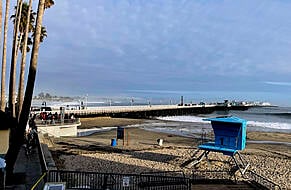Firefighters have kept wildfires at bay near the capital of Canada’s Northwest Territories as well as a city under threat in British Columbia, though no one claimed victory as forecasters warned that drier and windier weather was coming.
For Saturday at least, the weather was milder, providing some help for fire teams battling to contain the flames of Canada’s worst fire season on record that destroyed structures, fouled the air with thick smoke and prompted evacuation orders for tens of thousands of residents.
Officials said a huge wildfire again had been kept from advancing closer than nine miles from Yellowknife, the capital of the Northwest Territories that was left virtually empty when nearly all of its 20,000 residents fled for safety.
“We’re by no means out of the woods yet,” said Mike Westwick, wildfire information officer for the city. “We still have a serious situation. It’s not safe to return.”

To the south, in British Columbia, raging flames were also kept away from Kelowna, a city of 150,000 people about 90 miles north of the United States border.
The Kelowna fire is among more than 380 blazes across the province, with 150 burning out of control. The blaze near Yellowknife is one of 237 wildfires burning in the Northwest Territories.
At a Saturday evening news conference, Shane Thompson, the minister of environment and climate change for the Northwest Territories, said the fires near Yellowknife had not grown very much in the past few days thanks to breaks in the weather.
“But I want to be clear, a little bit of rain doesn’t mean it’s safe to come back home,” he said. Others warned that incoming hot weather would make the battle more challenging.
Yellowknife mayor Rebecca Alty encouraged residents to stay away to ensure their safety and help with firefighting efforts. She assured people that patrols were monitoring streets and homes to protect against looting.
The city has become a virtual ghost town since residents fled after an evacuation order was issued on Wednesday evening.

Long caravans of cars choked the main highway and people lined up for emergency flights to escape the blaze. The last 39 hospital patients were flown out on Friday night on a Canadian Forces plane, officials said.
On Saturday, officials said the escape route out of Yellowknife was safe, for the time being. About 2,600 people remained in town, including emergency teams, firefighters, utility workers and police officers, along with some residents who refused to leave.
Charlotte Morritt was among those who left on Thursday, reaching that decision because of the unbearable smoke that she feared would be unhealthy for her four-month-old son.
Ms Morritt, a journalist with the Aboriginal Peoples Television Network, and her son took an evacuation flight some 950 miles west to safety in Whitehorse, Yukon, while her partner stayed behind to monitor their property and help create firebreaks and fight fires.
“We knew it was only a matter of time,” said Ms Morritt, who had been following media updates and satellite images of the approaching wildfires.
Air tankers dropped water and fire retardant to keep the flames from Yellowknife. A six-mile fire line was dug, and firefighters deployed 12 miles of hose and a plethora of pumps.
Canada has seen a record number of wildfires this year that have caused choking smoke in parts of the US.
All of British Columbia was under a state of emergency on Saturday. About 35,000 people had been ordered to evacuate wildfire zones across the province and an additional 30,000 people were under an evacuation alert, meaning they should be prepared to leave, premier David Eby announced.
Mr Eby told reporters that the situation was “grim” and warned that the “situation changes very quickly”.
He said he was restricting non-essential travel to fire-affected areas to free up accommodations such as hotels, motels and campgrounds for displaced residents and firefighters.







